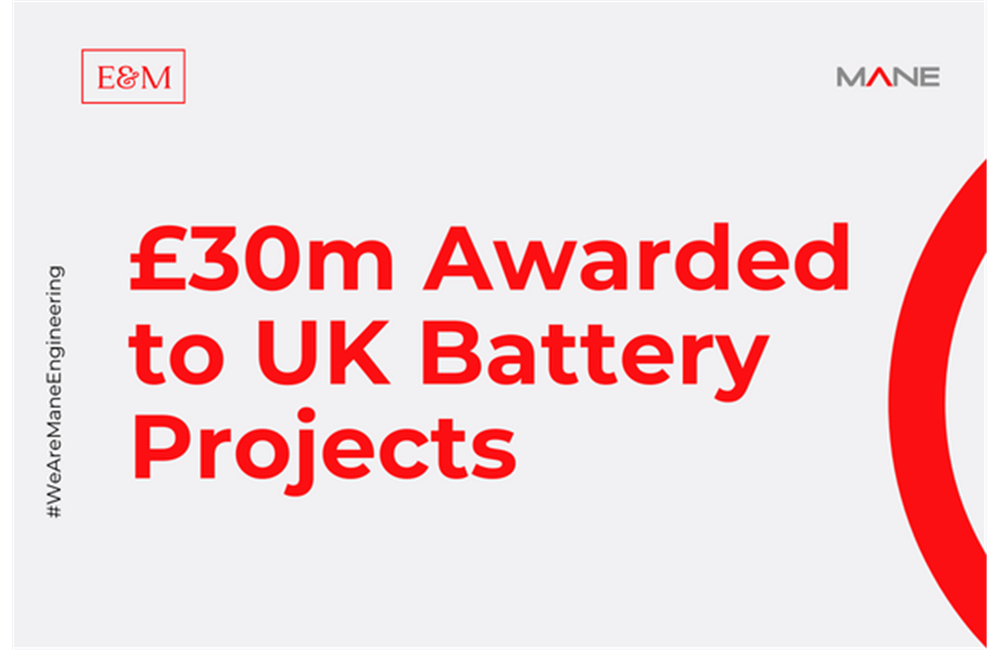£30m Awarded to UK Battery Projects
12 May, 202310 minsThe government has announced plans to award three leading businesses a portion of £30 ...

The government has announced plans to award three leading businesses a portion of £30 million funding, in bid to help develop technologies for storing sustainable energy- crucial for countries intent on forging ahead with affordable renewable energy.
A study released by McKinsey states that long duration energy storage (LDES) is likely to be able to distribute 1.5-2.5 TW of energy by 2040, and help 1.5- 2.3 billion t/y of CO2e from impacting on the atmosphere. However, the report does also state that to reach the renewable targets, the cost of LDES technologies will need to be significantly reduced, and government support will be crucial.
The Longer Duration Energy Storage Demonstration (LODES) competition first launched in June 2021, with an aim to achieve the cost cutting that is required. It’s a £69 million initiative that forms part of the government’s top ten key impact areas within the Net Zero Innovation Portfolio. £6.7 million has already been awarded to projects during the first phase, and phase two will now see funding allocated to Cheesecake Energy (CEL), Synchrostor and Invinity Energy. Each project is now able to move forwards with their technologies for longer duration storage capability.
CEL
CEL are set to receive £9.4 million to run tests on their FlexiTanker technology, which will see them installing energy storage systems being set up as a microgrid to overcome local grid restrictions.
With a solar farm of up to 8MW, plus a central heat pump to store excess solar power, the site will have electricity powered by the FlexiTanker via an electric motor, which drives an air compressor.
This process generates intense heat and high pressure air, which is then captured and kept in a thermal store. It’s then held in an air tank together with the high-pressure compressed air, which by this point has been cooled.
To discharge the battery, the process is then reversed, so that the heat in the thermal store can re-heat the high pressure air, expanding it and thus driving a generator at a sustained speed. This creates premium AC electricity, capable of supplying 20 hours for more than 25 years- and at a much lower cost than is incurred by lithium storage over a 5-10 year span. It also has an extremely low environmental footprint.
Synchrostor
Synchroster’s proposed £9.4 million will go towards building a 1 MW pumped thermal energy storage (PTES) demonstration plant, directly connected to the grid.
Based on a high-pressure, multi-cylinder, positive-displacement compressor-expander machine, the system will use electricity to run the compressor, bringing the pressure and temperature of an operating gas up.
A heat exchanger is used to heat the thermal storage material, so the it can be stored at atmospheric pressure, via an insulated storage silo. The gas drops in pressure and temperature as it leaves the heat-exchanger and enters the expander, and then a second heat exchanger enters to allow cold gas to cool a separate flow of storage material. This cold material will then leave the heat exchanger for a cold storage silo, and then gas then returns to the compressor for the cycle to continue.
When the full storage depth is met, the discharging cycle begins, and the entire process is reversed. Synchroster estimate that there will be very little lost energy when charged, and the battery will last for around 20 years.
Invinity Energy
With the largest portion of the funding at £11 million, Invinity Energy aim to develop and manufacture their 7mW vanadium flow battery (VFB), capable of delivering 30mWh for 4 hours.
The plan is for this battery to become the largest grid-scale of its kind ever produced in the UK- and one of the largest flow batteries in the world, able to operate on full power for over four hours.
Utilising tried and tested storage technology, the vanadium flow battery will have much more able to retain energy, whilst at the same time maintaining high performance. The battery is also predicted to be much safer and more durable than traditional lithium-ion batteries, and more than 97% recyclable by the time it reaches the end of its lifespan- expected to be more than 25 years.
Invinity’s project looks set to produce a battery capable of delivering more than 7MW of power, on demand, and with fast-response technology. This means the company can ensure a vast range of services to the grid, ensuring power for daily energy use to more than 3,500 homes.


